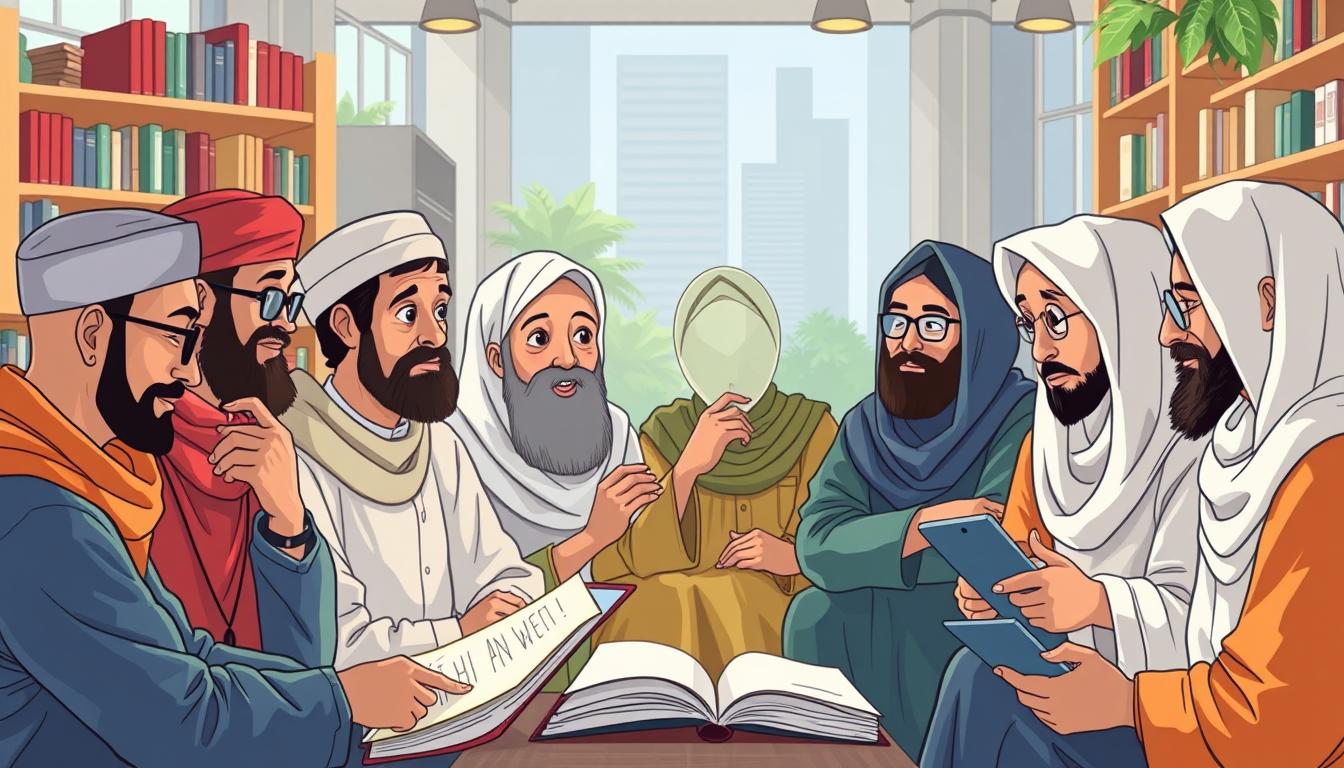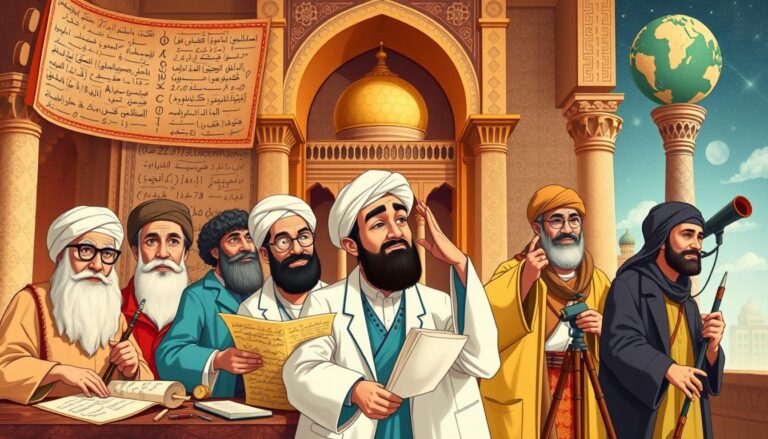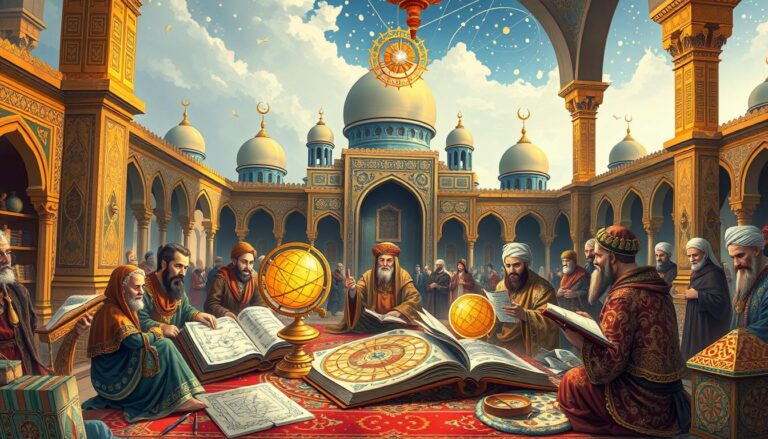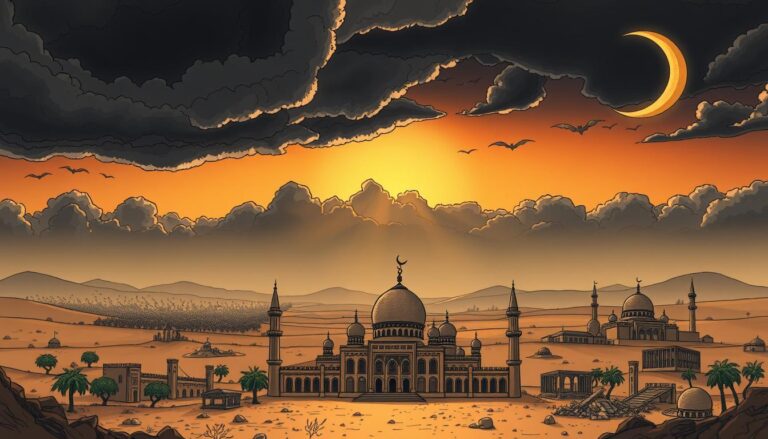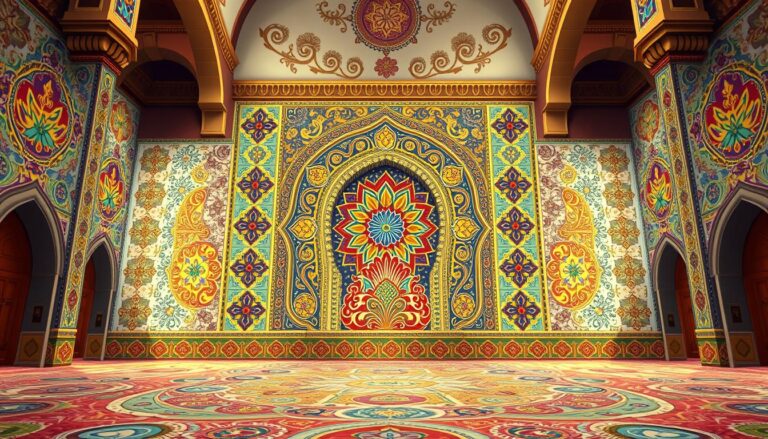5 Inspiring Modern Muslim Thinkers to Follow Today
Who are the voices shaping Islamic thought in our rapidly changing world? A new generation of Muslim thought leaders is emerging. They bridge tradition and innovation, tackling pressing issues and inspiring millions.
These influential Muslim writers are reimagining what it means to be Muslim in the 21st century. They offer hope and guidance to those seeking to reconcile faith with modern challenges.
Did you know that since 2007, organizations like Muslims for Progressive Values have been working to establish inclusive Muslim communities globally? Young Muslims as young as 28 are leading efforts to combat misinformation and support vulnerable populations during crises like the COVID-19 pandemic?
These statistics highlight the growing impact of modern Muslim thinkers who are actively addressing contemporary issues. Let’s explore five inspiring voices that are shaping the future of Islamic thought and practice.
Key Takeaways
- Modern Muslim thinkers bridge tradition and contemporary challenges
- They address issues like gender equality, interfaith dialogue, and social justice
- Young Muslims are emerging as thought leaders in various fields
- Organizations support the development of progressive Muslim communities
- These thinkers inspire millions worldwide through their writings and activism
The Importance of Modern Muslim Thought Leaders
Modern Muslim thought leaders are key in shaping today’s Islamic discourse. They connect tradition with modern life, offering new views on old wisdom. With over 350 million followers, their work is vital across the globe.
Bridging Tradition and Modernity
Muslim public figures aim to merge old religious teachings with today’s world. They show how the Quran’s 6,000 verses can guide us now. This keeps Islam relevant while respecting its history.
Addressing Contemporary Challenges
Muslim social activists focus on topics like interfaith dialogue, gender equality, and justice. They draw from Islamic values of unity and doing good. They use digital platforms to reach people worldwide, promoting peace and understanding.
Inspiring New Generations
These leaders inspire youth by mixing old traditions with new ideas. They host events like the Fes Festival of Sacred Music, showing Islam’s artistic side. This draws young Muslims to their faith in a meaningful way.
“Islam interacts with various cultures, influencing and being influenced by them. This exchange of ideas shapes the future of Islamic thought.”
By tackling today’s issues and inspiring youth, these thinkers keep Islam relevant in our fast-changing world.
Criteria for Selecting Inspiring Muslim Thinkers
Choosing reformist Muslim thinkers is a careful task. They must tackle today’s Muslim challenges. Their impact on the global Muslim community, especially the young, is crucial.
Modern Islamic scholars must connect tradition with today’s issues. They should address topics like purpose and burnout, common among young Muslims. Research shows over 90% of young Muslims struggle to find their purpose.
- Relevance to current challenges
- Ability to inspire new generations
- Diverse backgrounds and perspectives
Reformist Muslim thinkers must blend traditional Islamic scholarship with modern contexts. They should draw from figures like Malcolm X and Rumi. This helps Muslims deal with globalization and political loss in many societies.
“The duty of Muslims is to establish an Islamic state where they can live according to the laws of Allah, reflecting the core purpose of human existence according to the Qur’an.”
Effective modern Islamic scholars focus on leadership and power for divine goals. They guide Muslims in applying the Prophetic message in society. This balance helps create leaders for the 21st century’s Muslim challenges.
5 Inspiring Modern Muslim Thinkers to Follow Today
The world of Islamic thought is filled with influential writers. They are making a big impact in the 21st century. These thinkers come from different backgrounds and tackle important issues, reaching Muslims everywhere.
Diversity in Thought and Background
The 5 thinkers we’ll look at have unique views. Some are rooted in traditional Islamic studies. Others bring new ideas from sociology and human rights. This mix adds depth to the Muslim community’s conversations.
Impact on Global Muslim Community
These thinkers have greatly influenced Islamic thought and practice. Their work spans the globe, touching millions of Muslims. For instance, one scholar started a key Islamic college in the U.S. Another was named one of the “25 Influential American Muslims” by CNN.
Relevance to Contemporary Issues
Today’s Muslim thinkers focus on big issues like gender equality and interfaith dialogue. They also explore Islam’s role in modern society. Their writings and talks help Muslims deal with today’s complex world.
- 40% of female scholars hold degrees from prestigious institutions
- 60% of listed scholars are affiliated with the Yaqeen Institute
- Collectively published at least 5 books on Islamic studies and spirituality
Exploring the work of these 5 thinkers, we see how they’re guiding Islamic thought for the next generation. Their insights are valuable for both Muslims and non-Muslims wanting to understand Islam’s role today.
Tariq Ramadan: Reformist Islamic Scholar
Tariq Ramadan is a key figure among today’s Islamic thinkers. Born in Switzerland, he combines Western education with Islamic roots. He studied French literature and European philosophy, even writing a thesis on Nietzsche.
Key Ideas and Contributions
Ramadan advocates for a European Islam that fits with democratic values. He believes Western Muslims can make a difference as citizens without separate systems. This idea appeals to many educated Muslims and leftists worldwide.
Notable Works and Publications
Ramadan is known for his writing, speaking, and advising. His books delve into Islamic activism in different areas, like politics and civil society. They explore how religious symbols and actions evolve in a global world.
Influence on European Muslims
Ramadan has a big impact on European Muslims. He talks about integration and identity, urging Muslims to accept their dual roles. He believes Western Muslims can bring about positive change because of their freedom and unique position.
“Western Muslims have the potential for significant impact and can play a crucial role as European citizens.”
Ramadan’s way of reforming Islam, mixing tradition with modernity, influences many. He inspires a new generation of European Muslims to think differently.
Amina Wadud: Feminist Islamic Scholar
Amina Wadud is a leading voice in progressive Muslim circles. Born in 1952 in Maryland, she converted to Islam in 1972 while at the University of Pennsylvania.
Wadud’s academic achievements are impressive. She earned a Ph.D. in Arabic and Islamic Studies from the University of Michigan in 1988. Her book, “Qur’an and Woman: Rereading the Sacred Text from a Woman’s Perspective,” was published in 1992. It challenged old views and started talks on gender equality in Islam.
Now a Professor Emeritus, Wadud keeps shaping Islamic scholarship. Her research looks into classical Islamic texts, focusing on sexual diversity and dignity. She aims to start deeper talks on gender and sexuality in Islamic thought.
“Gender jihad emphasizes the struggle for gender and sexuality issues within communities.”
Wadud’s influence goes beyond the classroom. In 2005, she led Friday prayers for both men and women in the U.S. This move sparked debates on women’s roles in Islam. Her work and writings have inspired many scholars to rethink gender norms in religious settings.
Wadud’s ongoing efforts make her a key figure in Islamic feminism. She encourages deep thinking about different views of Islamic intellectual history.
Hamza Yusuf: American Islamic Scholar and Educator
Hamza Yusuf is a key figure among Muslim leaders. Born in 1958, he has greatly influenced Islamic education in the West. He is ranked 36th on the list of the top 500 most influential Muslims by Jordan’s Royal Islamic Strategic Studies Centre.
Zaytuna College and Islamic Education
Yusuf co-founded Zaytuna College, the first accredited Muslim liberal arts college in the U.S. This achievement marked a big step in Islamic education in America. He also earned a Ph.D. in Islamic Studies from the Graduate Theological Union in 2020.
Interfaith Dialogue Initiatives
Yusuf works hard to bring different religions together. He spoke at the World Economic Forum in Davos, Switzerland, about the importance of unity. His work with the Forum for Promoting Peace in Muslim Societies in the UAE shows his commitment to peace.
Traditional Islamic Scholarship in Modern Context
Yusuf is known for making Islamic scholarship relevant today. He tackles modern issues while staying true to Islamic traditions. His YouTube channel has 128 thousand subscribers and 8.7 million views, sharing his wisdom.
“Islam teaches us to respect all of God’s creation.”
Yusuf has faced challenges but remains a respected voice in Islamic thought. He bridges the old and the new, showing respect for all creation.
Ingrid Mattson: Islamic Chaplaincy and Community Leadership
Ingrid Mattson is a leading figure in Islamic chaplaincy and interfaith relations. She was the first woman to lead the Islamic Society of North America. Her work has opened doors for more inclusive leadership in Muslim communities.
Mattson understands the challenges faced by religious leaders in Western Muslim communities. She saw how imams often lack job security and proper benefits. This led her to explore new ways for spiritual guidance.
Her work fills a big gap in Islamic education. Many scholars know a lot but lack practical skills for community leadership. Mattson’s goal is to prepare Muslim social activists for real-world challenges.
“We need to foster both love and respect within Muslim communities for them to thrive effectively.”
Mattson’s efforts tackle several important issues:
- Creating standardized curricula for basic Islamic studies
- Developing specialized training for Islamic teachers
- Promoting interfaith dialogue and understanding
- Addressing social issues within Muslim communities
Through her work, Mattson is shaping Islamic leadership in North America. She inspires a new generation of Muslim leaders to engage with their faith and society.
Khaled Abou El Fadl: Islamic Law and Human Rights
Khaled Abou El Fadl is a leading figure among contemporary Islamic intellectuals. He focuses on Islamic law and human rights. He connects traditional Islamic jurisprudence with modern human rights ideas.
Contributions to Islamic Jurisprudence
Abou El Fadl’s work changes how we see Islamic law. He shows that Islamic legal traditions can align with human rights. His book, “The Death Penalty, Mercy, and Islam,” looks at how Islamic ethics relate to capital punishment.
Advocacy for Democracy
Abou El Fadl supports democracy in Muslim-majority countries. He thinks Islamic values can back democratic systems. His writings challenge the idea that Islam and democracy can’t mix. This has led to key discussions among reformist Muslim thinkers.
Critiques of Extremism
Abou El Fadl strongly opposes extremism. He says radical views of Islam are wrong. His book, “The Great Theft,” highlights the errors in extremist beliefs, offering a balanced look at Islamic traditions.
“Islamic law is not synonymous with authoritarianism. It has a rich tradition of ethical reasoning that supports human rights and democratic values.”
Abou El Fadl’s work has greatly influenced how we view Islam today. His ideas encourage scholars and everyday Muslims to think deeply about their faith and its place in society.
The Impact of Digital Platforms on Muslim Thought
Digital platforms have changed how Muslims connect with their faith and share ideas. Social media and online forums create new ways for Muslim public figures to reach people worldwide. This shift has opened doors for diverse Islamic views and sparked conversations between scholars and everyday Muslims.
Progressive Muslim voices now have wider reach thanks to technology. A recent study in Australia found that young Muslims see social media as a key part of their cultural identity. It helps them feel connected, especially during times when meeting in person is hard.
But this digital world comes with challenges. Big tech companies control much of what we see online. Their business models can sometimes put profit over promoting thoughtful content. This might make it harder for people to find balanced information about Islam.
- 3% of Australians identify as Muslim
- 37% of Australian Muslims were born in the country
- 63% come from North Africa, the Middle East, and South/Central Asia
Muslim families are finding ways to balance online life with faith. Some set aside tech-free time for prayer and family bonding. This helps them stay connected to their roots while exploring the digital world.
As more Muslim thinkers embrace digital platforms, they’re reshaping how people learn about and practice Islam in the modern age. This online shift is creating new opportunities for dialogue and understanding within the global Muslim community.
Challenges Faced by Modern Muslim Thinkers
Today’s Islamic intellectuals face many hurdles. They try to keep tradition alive while moving forward in a changing world. This is a big task for Muslim thought leaders.
Balancing Tradition and Progress
Muslim thinkers must keep Islamic values strong while tackling today’s problems. Dr. Mahathir bin Mohamed suggests mixing secular knowledge with Islamic teachings. He believes in being modern yet staying true to Islamic values.
Navigating Political and Social Pressures
Muslim leaders often face opposition from conservative groups. They also struggle to get noticed by Western media. This makes it hard for them to share their ideas.
They need to reinterpret Islamic teachings for today’s world. This is called a renaissance of ijtihad.
Addressing Misconceptions about Islam
Islamic thinkers work hard to fight off bad stereotypes about Islam. They say Islam values knowledge and skill. They want to show Islam’s role in science and exploration.
“Criticism in light of Islamic criteria is essential to prevent Islam from becoming subordinate to other ideologies and to foster a holistic perspective within Muslim societies.”
Despite the obstacles, Muslim leaders keep inspiring their communities. They help bridge the gap between old and new. They also tackle big global problems.
How to Engage with Modern Muslim Thinkers’ Ideas
Exploring the works of influential Muslim writers and scholars can deepen your understanding of Islam. Begin by reading their books, articles, and social media posts. They often share their insights through podcasts and online lectures, reaching many people.
- Join online forums or study groups focused on Islamic thought
- Attend local seminars or workshops led by Muslim scholars
- Participate in interfaith dialogues to gain diverse perspectives
- Follow reputable Islamic news sources for current discussions
Islam is rich with different viewpoints. It’s important to explore various perspectives to gain a full understanding. Modern scholars often tackle today’s issues, connecting old teachings with new challenges.
“Engaging with modern Muslim thinkers has expanded my knowledge of Islamic history and principles. Their insights have helped me navigate my faith in today’s world,” shares a 69-year-old listener from Tampa, Florida.
By engaging with these thinkers, you can improve your critical thinking and join important discussions. This is key for spreading Islamic knowledge and encouraging intellectual growth.
Conclusion
The 5 inspiring modern Muslim thinkers mentioned in this article show the diversity of Islamic thought today. They, from Tariq Ramadan to Khaled Abou El Fadl, are connecting old traditions with new ideas. Their work is like the 19th-century Tanzimat reforms in the Ottoman Empire, aiming for change.
Like Mirza Malkom Khan in 19th-century Iran, today’s thinkers are facing modern challenges. They’re working on issues like women’s rights and talking to people of other faiths. This is similar to Azerbaijan giving women the right to vote in 1918, before many European countries.
These 5 thinkers are carrying on the work of Islamic modernists. They’re trying to understand Islam in today’s world. Their efforts are like those of scholars who wrote about science and social justice, adapting to new times while staying true to Islamic values.
By exploring their ideas, we learn a lot about Islam in our world today. Their work, like past efforts to change legal systems in Muslim-majority countries, shows Islam is alive and changing. These leaders are helping shape a future where Islamic knowledge is still important and relevant in our fast-changing world.
Source Links
- Why We Need Ulama: The Importance of Seeking Islamic Knowledge From Scholars | Yaqeen Institute for Islamic Research
- Muslims for Progressive Values
- Meet 10 leaders who can inspire you to change the world – Office of the Secretary-General’s Envoy on Youth
- Sufism in the 21st Century Islam
- Islam Past and Present
- How to Find Your Purpose as a Muslim
- The concepts of leader and leadership in Islam
- 9 Female of Scholars of Islam, Quran and Hadith You Need to be Following
- Top 20 Islamic Scholars in History: Work and Impact
- List of converts to Islam
- Modern Islamic Thinking and Activism
- Tariq Ramadan Has an Identity Issue (Published 2007)
- JPASS Home
- Amina Wadud
- Gender, sexuality and identity: An interview with Islamic feminist Dr Amina Wadud
- Gender Justice as a Way of Life: The Reading of Amina Wadud
- Hamza Yusuf
- Hamza Yusuf Lectures | Halal Tube
- Advice for Students of Knowledge Overseas: A Meeting with Dr. Ingrid Mattson
- Cultivating Human Rights: Islamic Law and the Humanist Imperative
- Muslim Modernism, Islamic Law, and the Universality of Human Rights
- Reasoning With God: Reclaiming Shari’ah in the Modern Age
- Islamic Ethics and The Rise of Digital Technology – Maydan
- Social Media and Online Digital Technology Use Among Muslim Young People and Parents: Qualitative Focus Group Study
- Islam and its Challenges in the Modern World
- Islam and Modern Trends | Religious Studies Center
- Contemporary Challenges to Islam & Muslims: Atheism
- The Thinking Muslim
- Answers to Frequently Asked Questions About Islam – ING
- Innovation & Creativity in Islam — The Oasis Initiative
- Islam and modernity
- Qutb, Sayyid | Internet Encyclopedia of Philosophy
- The Five Pillars of Islam in the Hadith

